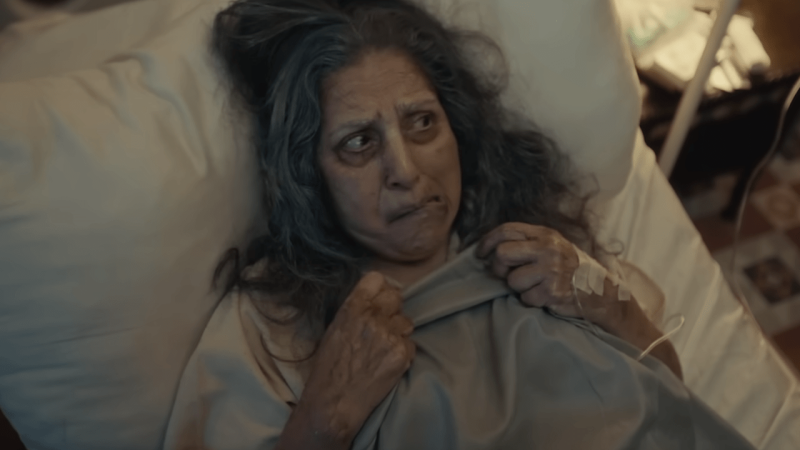Drama isn't supporting Urdu right now and won't in future either: Noorul Huda Shah
Ever since India's Zindagi channel started broadcasting Pakistani dramas, people were convinced that the local drama industry had reached new heights, almost like the 'good old days of the PTV'. Yesterday at the 8th International Urdu Conference, the industry's veterans begged to differ.
Starting much after its scheduled time, the discussion held at the Arts Council Karachi saw writers and actors speak at the session titled 'Urdu, Drama and Film', which was moderated by Syed Nusrat Ali.
While film was not heavily discussed, the panel comprising Asghar Nadeem Syed, Haseena Moin, Noorul Huda Shah, Talat Hussain, Iqbal Lateef and Mustafa Qureshi shared strong opinions about the quality of Pakistani television.
Our film industry suffered because of illegitimate financing: Asghar Nadeem Syed
Speaking about the relationship of the Urdu language with film, writer Asghar Nadeem Syed offered the view that the language used in film today, even in Bollywood, was Urdu (as opposed to the popular opinion that Bollywood film are in Hindi). When this viewpoint was highly contested across the border, many actors raised their voice in support of Urdu because it is a widely understood language.

He lamented that film, which was a medium that effects social change and hones sensibilities, was wasted due to two reasons: "The reason why the medium of film slipped from our hands was the lack of expertise and illegitimate financing, which ultimately led to a depression."
Dramas are being penned by those who don't even know its ABC: Iqbal Lateef
Producer/actor Iqbal Lateef focused on the commercialisation of dramas. Drawing from his 30 years of experience with PTV, he said: "Drama has been a victim of commercialisation and is being looked after by marketing officials, so how exactly will it contribute to the language will be decided by history."
Referring to the PTV's golden years, He added that the channel's success wasn't due to its monopoly but because of the immense hard work put in by the directors, writers as well as the actors: "We rehearsed our dramas for four to five days and literary personalities like Iftikhar Arif, Muddabir Rizvi were the script editors."

He listed young people trying to make dramas in a film-like way and vice versa as another issue: "We make dramas on a single camera and feel proud when it’s a hit because marketing is backing the project. The true soul of dramas, which has had a relation with literature, hit rock-bottom a while ago. When writers like Asghar Nadeem Syed and Haseena Moin seldom write for TV and dramas are instead getting penned by those who don’t know the ABCD of dramas, then where will the industry head to?" he posed as a rhetorical question.
However, he was hopeful about the revival of the Pakistani film industry and hoped that cinema houses will replace shopping plazas.
Drama is neither supporting Urdu now nor will it do so in the future: Noorul Huda Shah
TV stalwart Noorul Huda Shah agreed that the past was glorious but came with its own set of challenges. "There was a time in the past when we weren't allowed to show a double bed in a room, yet we still had to find a way to depict rape," she said.
She added that she was frequently made to clarify her position on dramas because the channel head wasn't happy with it.

Shedding light upon the current scenario, she said that earlier writers had a literary background but now a majority of writers are more concerned with sustaining themselves financially as opposed to staying true to the genre.
“I once asked a content head of a channel to write a drama and assured him that I’ll help him. Two months passed but nothing materialised. I finally called him and asked him whether he had read certain writers like Manto, Krishen Chandar. He said that he did so in his childhood. Then I asked him if he had read Aag Ka Darya (Quratulain Haider) and Udaas Naslain (Abdullah Hussain). He hadn’t read them so I asked him to read them in a month and within two days he was ready to resign from his job," she explained as the crowd laughed.
"With the PTV era gone, one thing is clear: drama is neither nurturing Urdu's development now nor will it do so in the future. However, Urdu is providing its support to drama by becoming a medium of communication," she said.
"Drama has now become a business," she continued. "There is a long chain which shows a sorry state of affairs — there is channel owner, then it is us who buy according to the owner’s wishes and numbers, then come the producers who have invested, then there are actors and at the bottom lays the writer."
Drama can be salvaged if the greed for money is curbed: Haseena Moin
Vouching for Noorul Huda Shah, writer Haseena Moin said that current dramas are replete with erroneous Urdu: "With the disappearance of script editors, this was bound to happen."
One example for this was given when a line in drama said "khoon me lahooluhaan" which means "bloodied in blood".
However, she was hopeful that drama can be saved if it is not monetarily driven: "Drama can be salvaged if the greed for money is curbed, which is something that has plagued our country leading to a destruction of drama as well as language."
Talat Hussain and Mustafa Qureshi also echoed the views shared by other veteran artists as Qureshi quipped that political talk-shows were better than drama, film or radio in terms of entertainment.












Comments